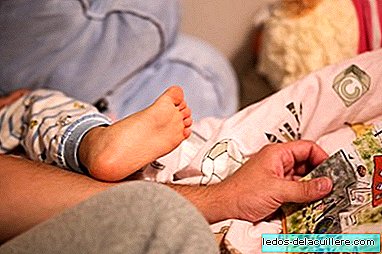
Having a premature baby can be very stressful and difficult for many couples. The early arrival of a baby is something that takes by surprise and worries parents, who spend day by day waiting for their baby to continue strengthening and growing in the Neonatal Intensive Care Unit (NICU). Finally, the day comes when your baby gets discharged and can go home with his parents, where they will now take care of him.
Taking a baby home for the first time after a hospital birth can cause us to feel nervous, and this certainly increases when it comes to a baby born prematurely. Now, a recent study, found that take a premature home, it is more stressful for fathers it is more stressful than for mothers.
In a statement posted on the website of the Northwestern University of Illinois, United States, researchers share the study they conducted to analyze the levels of stress that fathers and mothers live when they return home with babies born with very low weight and spent time in the NICU.
Both fathers and mothers of these premature babies had higher levels of cortisol, the stress hormone, in their saliva, before their baby was discharged. But in the case of parents, this continued to increase the following 14 days when they were already home, while the stress level of the mothers remained constant.
Dr. Craig Garfield, one of the authors of the study and associate professor of pediatrics and medical social sciences at the University School of Medicine, explains in the statement the reason why this may occur, and that is parents feel more pressured by the role that corresponds to them:
"The father goes from a situation in which the baby and the mother are taken care of by experts in the hospital, to have to attend simultaneously to their partner, the baby and their work when they return home. He is supposed to be the 'rock' for his partner, but stress can invade him deeply"he says.
To many couples, the "reality blow" that tells us that we are already parents, comes to us when we leave the hospital to go home, because there will be no medical staff supporting us and Now we are the only ones in charge of taking care of our baby.
To reach these results, the researchers used two ways to measure stress in parents: with salivary analyzes that measured cortisol levels, and written surveys where both explained how they felt. Both tests were done one day before discharge, the day they left the hospital, as well as on days 5 and 14 of having arrived home with their baby. During those 14 days after arriving home, parental cortisol levels rose rapidly, while those of the mothers returned to the point where they were at the beginning.
Another fact that they found during the investigation was that the stress levels obtained through salivary analyzes, were higher than those that parents themselves reported in writing. According to the researchers, this could indicate that parents are not aware of the true stress they feel.
"A day of feeling stress at home is no problem, but if your levels are still high after two weeks, then it is more worrisome"says Dr. Garfield, who recommends that there are actions that can be taken so that parents do not feel so stressed and their transition home is made easier.
One of these actions is to make more emphasis on make the father also feel comfortable while his baby is in the NICU and this helps him build more confidence. He also recommends that both fathers and mothers take turns taking time to relax and thus find ways to reduce the stress they feel.












